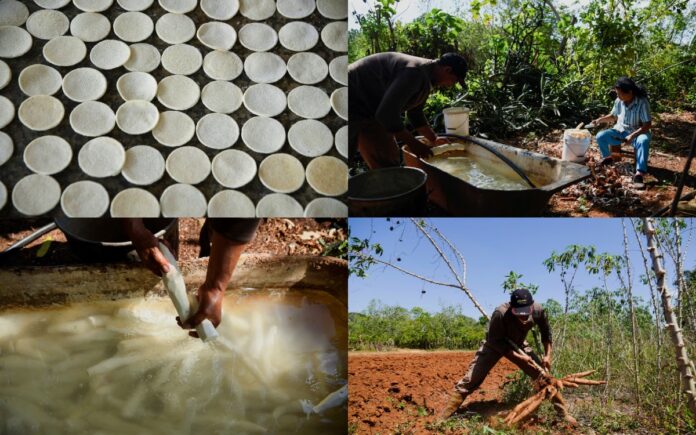Havana: In the heart of Old Havana, a popular restaurant is offering a culinary journey back in time with small, circular flatbreads made from ground yucca root. Known as casabe, the dish has been a staple in Cuban cuisine for over a thousand years, historians say. While it was once relegated to rural areas and field hands, it is now experiencing a revival as Cuba grapples with its severe economic crisis.
The island’s ongoing economic struggles have significantly reduced the import of key ingredients such as wheat flour, sugar, and salt, leading many to rediscover simpler, locally sourced foods. Casabe, made from the yucca root (also known as cassava), requires no imported ingredients, making it a practical and affordable option during times of scarcity.
“In a time of food crisis like the one we’re currently experiencing, we believe cassava bread can help,” said Yudisley Cruz, co-founder of Yucasabi, a small restaurant and business focused on yucca-based products. Her restaurant, located in the bustling tourist district of Old Havana, offers a single casabe for just 15 pesos (approximately 4 cents), making it both nutritious and accessible to locals and tourists alike.
Cruz’s restaurant is Cuba’s only establishment dedicated exclusively to yucca, and she hopes to popularize casabe in urban areas. However, in rural parts of Cuba, peddlers travel by foot, bike, and moto-taxi, selling the flatbread at even lower prices, making it a common and affordable food choice for nearly everyone.
Also Read | Travelers Without REAL ID Will Still Be Allowed to Fly, Says US Homeland Security Chief
Casabe’s widespread appeal, simplicity, and deep cultural roots have contributed to its resurgence. Originally prepared on hot rocks by Cuba’s indigenous Taino people, casabe has become an important part of the island’s culinary heritage. Last year, the United Nations added the food to its list of intangible cultural heritage of humanity.
Yucasabi’s interior features vibrant paintings of the Taino people in Cuba’s lush countryside, further honoring the bread’s history. The restaurant has also given the ancient flatbread a modern twist, hoping to attract a broader and younger clientele. Its social media advertising promotes the product as “Casabe from Cuba, 100% artisanal, vegan, zero gluten.”
Also Read | UK Police Must Be Better Prepared After Summer Riots Fueled by Misinformation, Watchdog Warns
Despite the modern touches, simplicity remains the key selling point of casabe, says Julio Cesar Nunez, an 82-year-old traditional casabe producer living outside Havana. Nunez oversees the entire process: harvesting the yucca, peeling, drying, grinding the root, and then shaping it into tortilla-like discs to cook on sheet metal over open flames.
“Anyone who takes the time to learn can do it,” he said, underscoring the flatbread’s accessible nature.



